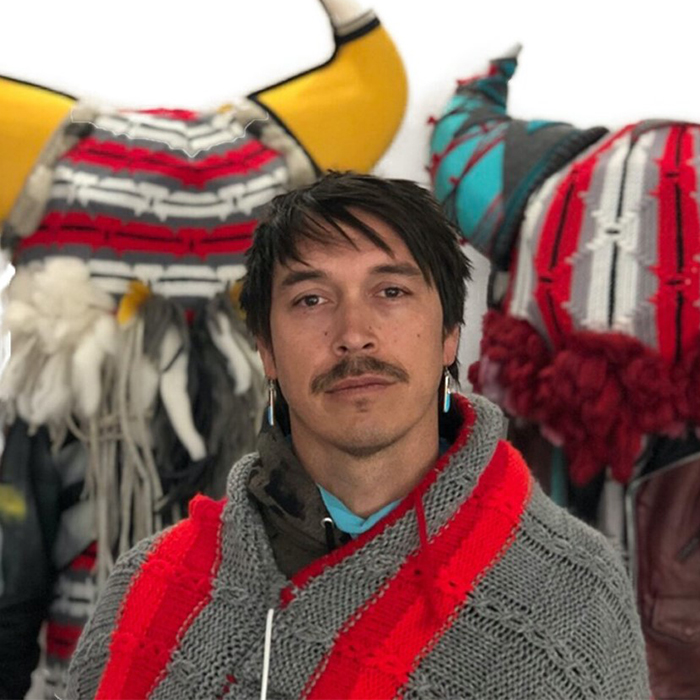Art, music, lectures, and nature walks for students are on tap through this weekend for Native American Heritage Month at Emory University, many of those through the Michael C. Carlos Museum. Two events take place today (Nov. 11), and many call for advance registration, so sign up as soon as you can.
Emory Climate Talk with artist Cannupa Hanska Luger
Online and in-person (Carlos Museum)
Thursday, Nov. 11, 4 p.m.
Click here for more details and registration information
Cannupa Hanska Luger, whose works are featured in the exhibition “Each/Other: Marie Watt and Cannupa Hanska Luger,” will participate in the Emory Climate Talks series, which explores the scientific and social aspects of global climate change.
Luger is a New Mexico-based multidisciplinary artist who uses social collaboration in response to timely and site-specific issues. Raised on the Standing Rock Reservation in North Dakota, he is an enrolled member of the Three Affiliated Tribes of Fort Berthold and is of Mandan, Hidatsa, Arikara, Lakota, and European descent. Luger produces multi-pronged projects that take many forms, and he interweaves performance and political action to communicate stories about 21st-century Indigeneity.
Among other works, Luger will discuss The Mirror Shield Project (2016), a social engagement work, which invited the public to create mirrored shields for Water Protectors protesting the Keystone pipeline at Standing Rock. The project has since been formatted and used in various resistance movements across the nation.
Georgia Seminar: Georgia’s Origin Stories
Online (Fox Center for Humanistic Inquiry)
Thursday, Nov. 11 (and each Thursday through Dec. 2), 5:30 – 7 p.m.
Click here for more details and registration information
Before there was a place called Georgia, the Yamacraw Creeks lived in relative exile on the banks of the Savannah River. Across the Atlantic, a group of influential Englishmen determined to found a colony—Britain’s thirteenth in North America—as a social, agriculture, and military experiment, free even of slavery, although that halcyon ideal would last only 17 years. James Oglethorpe and his fellow Trustees, with assistance from men and women both English and Creek (Tomochichi and Mary Musgrove were the most famous), made the Georgia colony a reality. They created an elegant city plan on Yamacraw Bluff and forged the most favorable relationship with Native Americans of any of the British colonies. During a mere forty years from founding, Georgia progressed from Trust colony to Royal colony to solidarity with the growing revolutionary spirit that led to American independence. This series explores the many fascinating “origin stories” from Georgia’s unique past.
Participation is limited, and reservations are required. The Zoom meeting link will be sent via email one week prior to the start date. Everyone from the Atlanta community is welcome and invited to join us for this free seminar. For further information and to reserve a spot on a “first-come basis,” email the Fox Center at foxcenter [at] emory [dot] edu.
Here Song Walk in Lullwater Preserve for Emory Students
Saturday, Nov. 13, 10 a.m. – noon
Click for more details; no registration needed.
Emory students are invited to join Cannupa Hanska Luger and master naturalist/nature photographer Kathryn Kolb for a guided walk through the wooded forest and open fields of Emory’s Lullwater Preserve, land originally inhabited by the Muscogee (Creek) before they were forced to relinquish it in 1821. Meet at the entrance to Lullwater Preserve at 1463 Clifton Road at 10 a.m.
Gallery Talk with artist Cannupa Hanska Luger (this event is full)
Sunday, Nov. 14, 2:30 p.m.
Level 3 Exhibition Galleries, Carlos Museum
Click for more details and registration information (in-person only)
Cannupa Hanska Luger, one of the two contemporary Indigenous artists whose work is featured in “Each/Other: Marie Watt and Cannupa Hanska Luger,” will give a gallery talk about his work in the exhibition, focusing on collaboration, social engagement, and innovative use of materials.
Recital/Lecture by Indigenous Violinist Heidi Senungetuk
Sunday, Nov. 14, 4 p.m.
Ackerman Hall, Carlos Museum
Click here for more details and registration information
In this recital/lecture, violinist and Emory visiting professor of music Heidi Senungetuk (Kingikmiut Inupiaq), will present two works that highlight Indigenous modes of creativity in music. The first of these two, “For Heidi Senungetuk,” was composed by Raven Chacon (Navajo Nation) as part of his series “For Zitkála Šá.” The second piece on the program, “Qutaaŋuaqtuit: Dripping Music,” was created for the ongoing art exhibition “Soundings: An Exhibition in Five Parts,” which brings attention to concepts of musical score interpretation, Indigenous language revitalization, interpretation of ancestral material arts, and musical performances as acts of sovereignty.
Related content:
Rose Library podcast
Access the podcast
A Conversation with Marie Watt, Cannupa Hanska Luger, and Megan O’Neil
In this episode of Community Conversations, connect with two incredible contemporary Indigenous artists—Marie Watt and Cannupa Hanska Luger—whose works are featured in “Each/Other: Marie Watt and Cannupa Hanska Luger,” a traveling exhibition currently on view at Emory University’s Carlos Museum.
Rose Library’s Community Outreach Archivist and Community Conversations host Lolita Rowe sat down with Watt, Luger, and Carlos Museum curator Megan O’Neil to explore ideas of community, making connections, collaborative art making, identity, and much more.
For more information on the exhibition “Each/Other,” which is open to the public through Dec. 12, 2021, visit the Carlos Museum website.
Land acknowledgment
Emory University acknowledges the Muscogee (Creek) people who lived, worked, produced knowledge on, and nurtured the land where Emory’s Oxford and Atlanta campuses are now located. In 1821, fifteen years before Emory’s founding, the Muscogee were forced to relinquish this land. We recognize the sustained oppression, land dispossession, and involuntary removals of the Muscogee and Cherokee peoples from Georgia and the Southeast. Emory seeks to honor the Muscogee Nation and other Indigenous caretakers of this land by humbly seeking knowledge of their histories and committing to respectful stewardship of the land.


